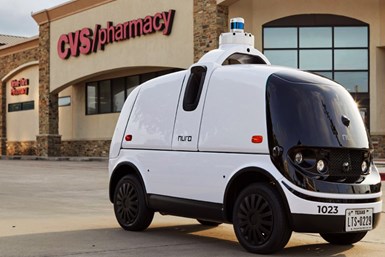Nuro Partners with CVS on Autonomous Vehicle Tests
Robo vehicles to deliver prescription medicine in Houston
Self-driving vehicles are starting to find niche applications amid the coronavirus pandemic as consumers increasingly turn to contactless delivery services.
The latest example is Nuro, which is expanding its testing in Houston to include home deliveries from CVS pharmacies. The company already is working with Kroger, Domino’s and Walmart in Arizona and Texas.
How it Works

Image: Nuro
Starting in June, local customers can choose the autonomous delivery option when placing an order to fill a prescription. Deliveries are made within three hours.
Better yet, there’s no charge for the service.
Users also can add nonprescription items to their orders. To ensure security, customers will have to confirm their identity and enter a code on a touchpad to retrieve their orders from a lockbox.
Evolving Tests
Initially the CVS program will be limited to one store using a modified Toyota Prius hybrid sedan (with a backup driver onboard) equipped with Nuro’s autonomous driving technology.
Service will be expanded to additional outlets and switch to Nuro’s purpose-built driverless R2 bot in coming months. About the size of a subcompact crossover vehicle—but half as wide—the gullwing-doored R2 can travel up to 25 mph.
In February, the R2 became the first vehicle in the U.S. to receive an exemption from federal safety standards, allowing it to operate autonomously on select streets.
Growing Trend
CVS, which was the first pharmacy to offer home-delivery service nationwide in 2018, says demand for the option has grown in recent months in the wake of the coronavirus.
The reasons are simple: convenience, safety, timeliness and logistics: three-fourths of the U.S. population live within three miles of a CVS pharmacy, according to the company.
COVID Applications
In addition to delivering food and pharmaceuticals, Nuro is one of several companies providing autonomous vehicles to healthcare facilities. The R2 models are used to shuttle medical supplies and food to workers at temporary hospitals in California.
Last month, Navya began transporting COVID-19 tests to the Mayo Clinic in Florida. Aptiv, Cruise, KiwiBot and Pony.ai also are stepping up with similar initiatives.
RELATED CONTENT
-
On Fuel Cells, Battery Enclosures, and Lucid Air
A skateboard for fuel cells, building a better battery enclosure, what ADAS does, a big engine for boats, the curious case of lean production, what drivers think, and why Lucid is remarkable
-
On Automotive: An All Electric Edition
A look at electric vehicle-related developments, from new products to recycling old batteries.
-
On Electric Pickups, Flying Taxis, and Auto Industry Transformation
Ford goes for vertical integration, DENSO and Honeywell take to the skies, how suppliers feel about their customers, how vehicle customers feel about shopping, and insights from a software exec









